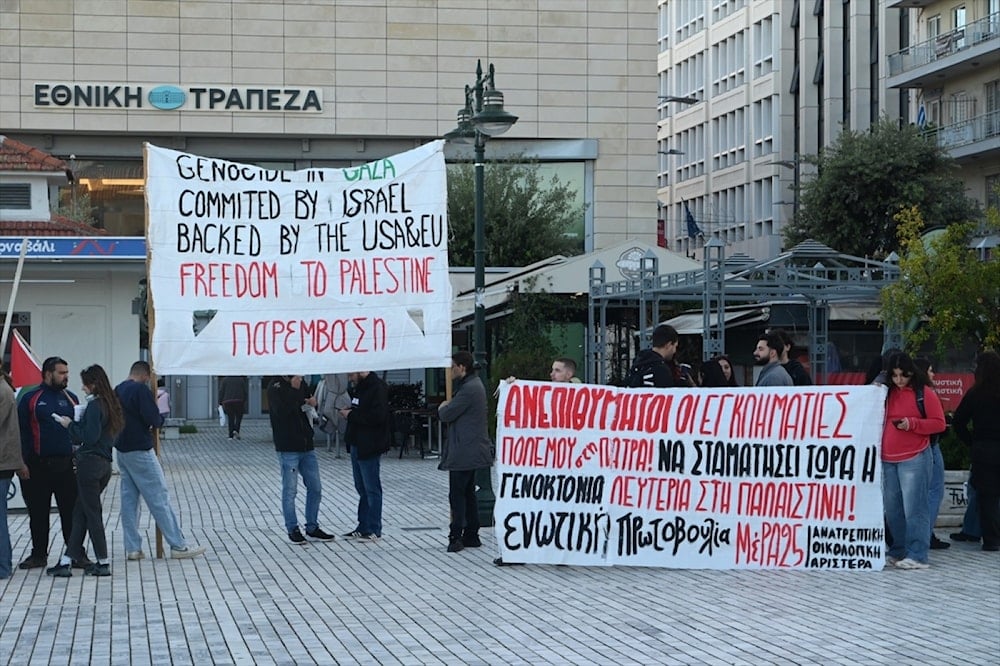'You’re not welcome in Greece': Israelis face port protests
Greek protesters continue to protest "Israel’s" genocide in Gaza, calling for an end to cooperation with Tel Aviv as anger over the war spills into the streets.
-

The cruise ship carrying Israelis, which was scheduled to arrive at Patra Port, changed its route due to protests by pro-Palestine supporters (Social media/X)
Greek authorities have tightened security at two major ports as growing global outrage over "Israel’s" genocide in Gaza spills into the streets, with protesters targeting a cruise ship carrying Israelis, a sign of the deepening international isolation facing settlers abroad.
Police reinforcements were deployed at Patras and Katakolo in the Peloponnese after demonstrations erupted earlier this week when the MS Crown Iris docked at Kalamata. In July, Israelis aboard the same vessel were barred from disembarking on the island of Syros after pro-Palestine demonstrators blocked the port, forcing the ship to divert to Cyprus.
Pro-Palestinian demonstrators gathered at Patras Port on October 29, to protest the arrival of the Crown Iris cruise ship carrying Israeli tourists. The protest prompted the vessel to reroute to Katakolos Port on the Peloponnese Peninsula, according to local reports pic.twitter.com/JPsHOk2Nsp
— TRT World (@trtworld) October 29, 2025
“We couldn’t keep quiet,” Christina Lada, a schoolteacher who joined the protest in Kalamata, told The Guardian.
“Despite the ceasefire, Israel is still continuing its attacks in Gaza. Innocent, unarmed civilians are being killed,” Lada stressed.
'You need the police'
From the upper deck, Israelis, many of them reportedly former members of the Israeli occupation forces, watched under armed police protection as pro-Palestine protesters chanted: “You need the police, you’re not welcome in Greece.”
Yannis Sifanakis, a veteran activist who has organized anti-war demonstrations across the country, said the protests were motivated by outrage over events in Gaza. “Those Israelis who support the actions of their government aren’t welcome here,” he declared, describing Greece and the wider Mediterranean as “a shared home” bound by geography and history.
International relations analyst Constantine Filis, head of the ACG Institute of Global Affairs in Athens, told The Guardian that Greece’s historical ties to the Arab world amplify public sensitivity to events in Gaza.
“Because of geographic proximity and our traditional ties with the Arab world, the average Greek is more sensitive to what is happening in Gaza than the average central or northern European,” he said. “But Israel is much more important for us as an ally and partner than it is for most European states.”
Stop any collaboration with 'Israel'
Greece has become a major destination for Israelis, with more than 600,000 arrivals recorded in 2024, a figure expected to rise this year. The flourishing tourism underscores the deepening strategic partnership between Athens and Tel Aviv since 2010, spanning economic, military, and energy cooperation.
“Greece is not going to risk its relations with Israel,” Filis said. “But from a humanitarian perspective, we must be more inclusive, more balanced, more determined to demonstrate the wrongdoings of Israel in Gaza.”
The scale of the protests has unsettled Israeli officials. In August, "Israel’s" Foreign Ministry warned its citizens to keep a low profile during visits, while local media described Athens, where pro-Palestine graffiti has reportedly appeared across the capital, as a “paradise lost".
Meanwhile, anti-war groups have expanded their demands. Earlier this month, around 5,000 demonstrators gathered on Crete to call for the closure of the Souda Bay naval base, a key NATO facility used for refueling US warships and aircraft bound for "Israel" since the start of the Israeli genocide in Gaza.
“There have been victories,” said Petros Constantinou, coordinator of Greece’s anti-racist movement Keerfa. “Our main demand now is to stop any collaboration with Israel.”

 3 Min Read
3 Min Read











